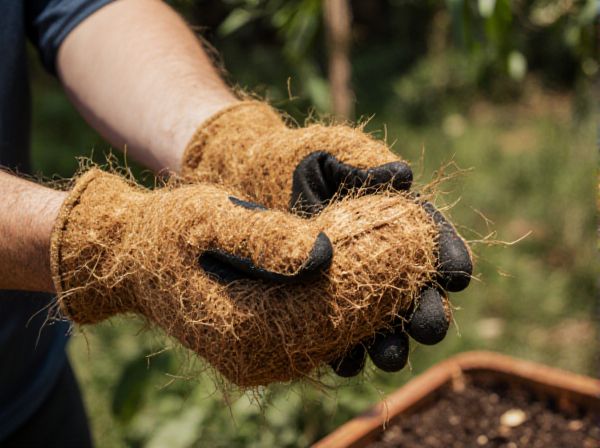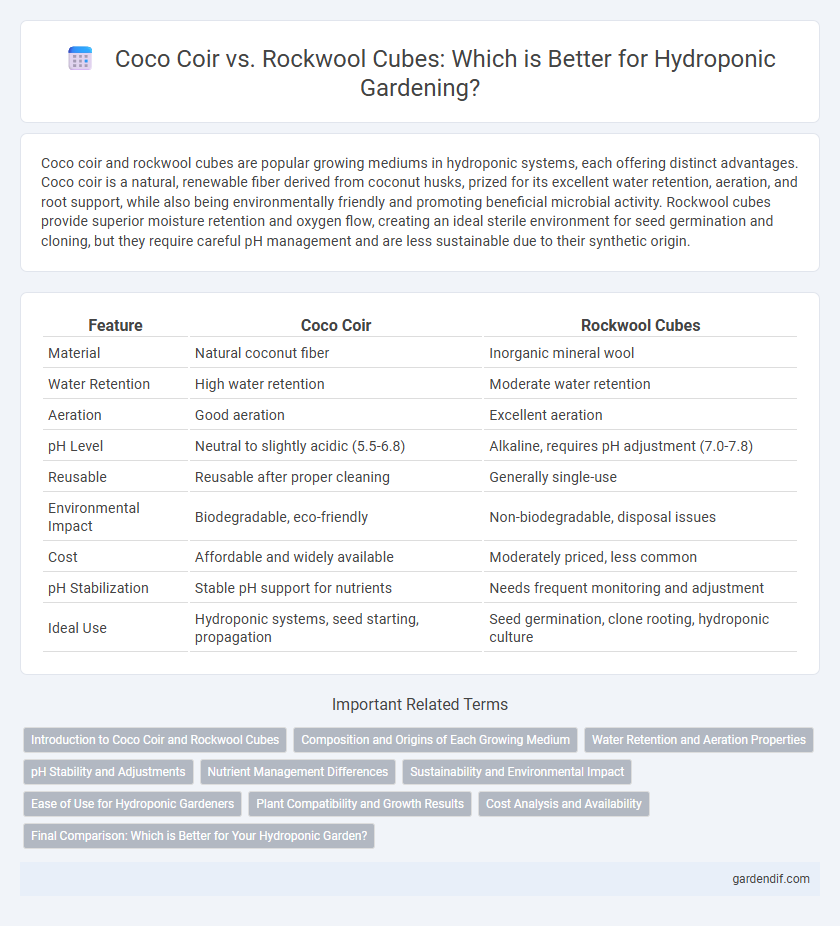
Coco coir vs Rockwool cubes Illustration
Coco coir and rockwool cubes are popular growing mediums in hydroponic systems, each offering distinct advantages. Coco coir is a natural, renewable fiber derived from coconut husks, prized for its excellent water retention, aeration, and root support, while also being environmentally friendly and promoting beneficial microbial activity. Rockwool cubes provide superior moisture retention and oxygen flow, creating an ideal sterile environment for seed germination and cloning, but they require careful pH management and are less sustainable due to their synthetic origin.
Table of Comparison
| Feature | Coco Coir | Rockwool Cubes |
|---|---|---|
| Material | Natural coconut fiber | Inorganic mineral wool |
| Water Retention | High water retention | Moderate water retention |
| Aeration | Good aeration | Excellent aeration |
| pH Level | Neutral to slightly acidic (5.5-6.8) | Alkaline, requires pH adjustment (7.0-7.8) |
| Reusable | Reusable after proper cleaning | Generally single-use |
| Environmental Impact | Biodegradable, eco-friendly | Non-biodegradable, disposal issues |
| Cost | Affordable and widely available | Moderately priced, less common |
| pH Stabilization | Stable pH support for nutrients | Needs frequent monitoring and adjustment |
| Ideal Use | Hydroponic systems, seed starting, propagation | Seed germination, clone rooting, hydroponic culture |
Introduction to Coco Coir and Rockwool Cubes
Coco coir, derived from coconut husks, is a natural, sustainable growing medium renowned for its excellent water retention, aeration, and root support in hydroponic systems. Rockwool cubes, made from spun molten rock fibers, provide a sterile and inert environment promoting strong seedling development with high water-holding capacity and good oxygen availability. Both media are popular in hydroponics, offering unique advantages for plant growth and root health management.
Composition and Origins of Each Growing Medium
Coco coir is made from the fibrous husks of coconut shells, providing a natural, sustainable, and biodegradable growing medium rich in organic matter and excellent water retention. Rockwool cubes consist of spun volcanic rock fibers, originating from melted basalt and chalk, offering high porosity and aeration but limited biodegradability. The organic origin of coco coir enhances microbial activity, while the inorganic composition of Rockwool supports sterile growing conditions.
Water Retention and Aeration Properties
Coco coir offers superior water retention due to its natural fibrous structure, holding moisture evenly while providing excellent aeration that promotes healthy root development in hydroponic systems. Rockwool cubes excel in aeration with a porous composition that ensures ample oxygen flow to roots but tend to retain less water, requiring more frequent irrigation. Balancing the water retention of coco coir and the aeration capacity of rockwool optimizes hydroponic growth environments.
pH Stability and Adjustments
Coco coir maintains a naturally stable pH range of 5.5 to 6.5, ideal for most hydroponic crops, and requires minimal pH adjustments during growth. Rockwool cubes typically start with a more alkaline pH around 7.5 to 8.0 and need frequent pH balancing to prevent nutrient lockout, as their high buffering capacity can affect nutrient uptake. Monitoring and adjusting pH regularly ensures optimal root health and nutrient availability in both growing media.
Nutrient Management Differences
Coco coir offers superior water retention and aeration, enabling more precise control of nutrient delivery and reducing the risk of over-fertilization in hydroponic systems. Rockwool cubes provide a highly inert medium with excellent moisture retention but require careful pH monitoring and frequent nutrient adjustments to prevent nutrient lockout. The distinct absorption and buffering capacities between coco coir and rockwool significantly impact nutrient management strategies for optimal plant growth.
Sustainability and Environmental Impact
Coco coir is a renewable and biodegradable growing medium derived from coconut husks, offering superior sustainability compared to Rockwool cubes, which are made from molten rock spun into fibers and are non-biodegradable. Coco coir promotes water retention and reduces the need for frequent irrigation, minimizing water wastage and environmental footprint in hydroponic systems. Rockwool's disposal challenges and energy-intensive production process result in greater environmental impact, making coco coir the more eco-friendly choice for sustainable hydroponic cultivation.
Ease of Use for Hydroponic Gardeners
Coco coir offers superior ease of use for hydroponic gardeners due to its natural water retention and aeration properties, reducing the need for frequent watering adjustments. Rockwool cubes require precise pH management and constant moisture monitoring to prevent drying or over-saturation, making them more challenging for beginners. The renewable nature and biodegradability of coco coir also simplify disposal and sustainability in hydroponic systems.
Plant Compatibility and Growth Results
Coco coir offers superior aeration and water retention, making it ideal for plants requiring well-drained yet moist conditions, such as herbs and leafy greens, which thrive with its natural buffering of pH and nutrients. Rockwool cubes provide a sterile, inert medium with excellent oxygen flow, preferred for plants needing consistent moisture levels like tomatoes and peppers, but require precise pH management to avoid nutrient lockout. Growth outcomes in coco coir typically feature robust root development and faster nutrient uptake, whereas rockwool supports steady, uniform growth, benefiting hydroponic systems demanding tight environmental control.
Cost Analysis and Availability
Coco coir offers a cost-effective and sustainable alternative to rockwool cubes, often priced lower due to its natural origin and widespread availability from coconut processing regions. Rockwool cubes, while providing excellent water retention and aeration, tend to be more expensive and less readily available in some markets due to manufacturing constraints and environmental regulations. Availability of coco coir is generally higher and more consistent globally, making it a preferred choice for large-scale hydroponic operations focused on budget efficiency.
Final Comparison: Which is Better for Your Hydroponic Garden?
Coco coir offers superior water retention, natural antifungal properties, and eco-friendliness, making it ideal for sustainable hydroponic gardens. Rockwool cubes provide excellent aeration and consistent moisture levels but require careful handling due to their synthetic composition and potential disposal issues. Choosing between coco coir and rockwool depends on factors like crop type, environmental impact, and ease of maintenance in your hydroponic system.
Coco coir vs Rockwool cubes Infographic

 gardendif.com
gardendif.com